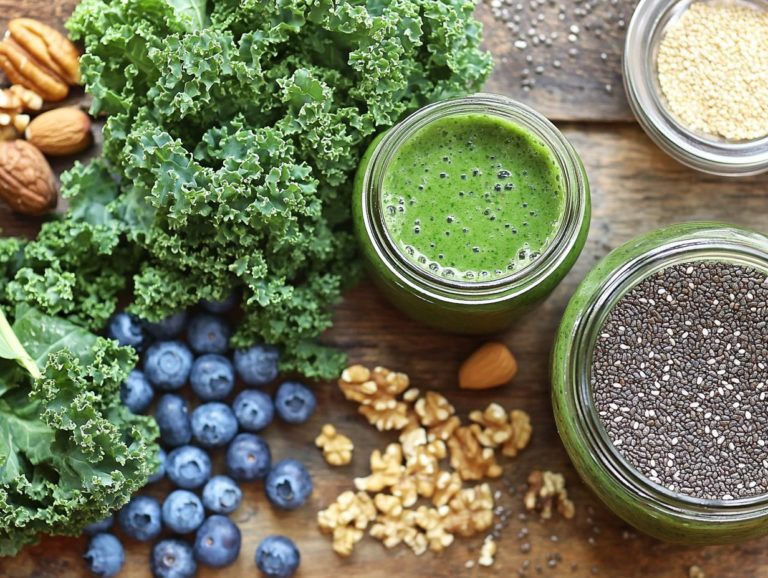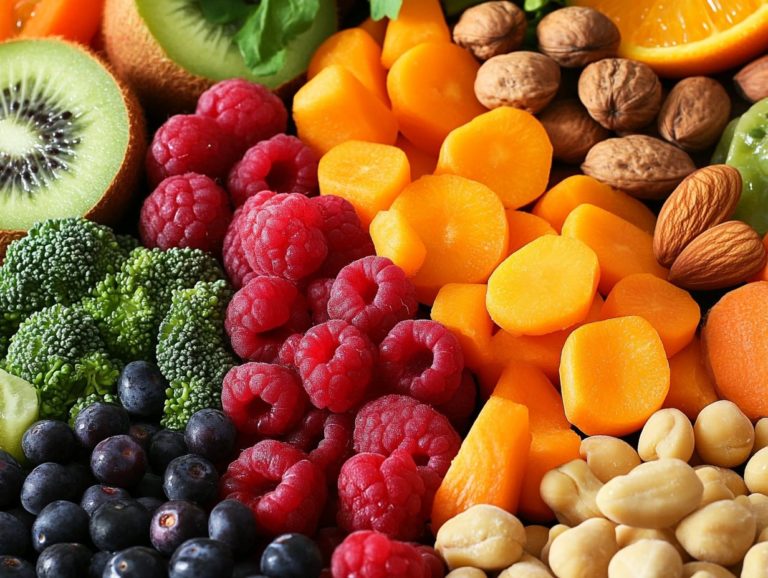The Benefits of Home Cooking for Nutritional Health
In today’s fast-paced world, prioritizing your nutrition may seem daunting. Embracing home cooking is a powerful way to improve your well-being.
This article explores why nutrition matters for your health. It shows how cooking at home gives you control over ingredients, saves money, and strengthens family bonds.
You’ll find practical tips for making healthier meals, solving common cooking challenges, and fitting meal prep into your busy schedule.
Discover the amazing benefits of home cooking and take charge of your nutrition!
Contents
- Key Takeaways:
- The Importance of Nutritional Health
- The Benefits of Home Cooking
- Improving Nutrition Through Home Cooking
- Addressing Common Barriers to Home Cooking
- Incorporating Home Cooking Into Your Lifestyle
- Frequently Asked Questions
- What are the benefits of home cooking?
- How does home cooking contribute to nutritional health?
- Can home cooking help with weight management?
- What are some other benefits of home cooking besides nutrition?
- Is home cooking time-consuming?
- How can someone start incorporating home cooking into their routine?
Key Takeaways:

The Importance of Nutritional Health
Nutritional health is vital for your overall well-being. It not only affects your health but also influences public health strategies against diet-related health problems.
Research from the International Journal of Behavioral Nutrition shows how important diet quality is for good heart health. With rising rates of obesity and related conditions like high blood pressure and type II diabetes, it s important to explore key dietary indicators for better health.
Why Nutrition Matters for Overall Health
Nutrition is crucial for your health. It helps maintain a healthy weight and balanced cholesterol levels while reducing the risk of chronic diseases.
Nutrition affects your energy, immune system, emotional health, and brain function. For example, diets like the DASH diet can help lower blood pressure by focusing on whole grains, fruits, and vegetables while cutting back on salt.
Monitoring key metrics like BMI is essential as they show the long-term effects of healthy eating. This lets you make informed choices for a healthier lifestyle.
The Benefits of Home Cooking
Home cooking has many advantages. It improves your diet by allowing you to control ingredients and ensure food safety.
Cooking from scratch lets you customize meals for specific dietary needs, boosting the health of your family and strengthening bonds.
In today s busy world, home cooking is an invaluable practice that enriches your life.
Control Over Ingredients and Portions
One of the primary advantages of home cooking is that you gain complete control over the ingredients and portion sizes in every meal, directly influencing the quality of your diet and your health outcomes.
When you take the time to prepare your meals, you can opt for fresh produce, whole grains, and lean proteins effectively elevating the nutritional profile of your dishes. For example, by swapping out refined carbohydrates like white rice for quinoa, you can introduce more fiber and essential amino acids, which are invaluable for digestion and muscle repair.
Incorporating healthy fats, such as avocados or olive oil, can further enhance your body’s absorption of fat-soluble vitamins like A, D, E, and K. On the flip side, being heavy-handed with salt or sugar can lead to health concerns like hypertension or obesity, highlighting the crucial importance of mindful ingredient selection in your kitchen.
Cost-Effective and Budget-Friendly

Cooking at home is often a more cost-effective choice compared to dining out, enabling you to enjoy nutritious meals while staying within your budget.
By preparing meals in your own kitchen, you can take full advantage of bulk buying and seasonal produce, which significantly reduces your grocery bills. This approach not only encourages better eating habits but also makes it easier to stick to dietary plans, such as vegetarian or low-carb options, all without breaking the bank.
Home cooking allows you the freedom to experiment with various ingredients and recipes, leading to healthier choices tailored to your specific nutritional needs. Ultimately, you can savor a delightful array of cuisines and flavors while ensuring that your financial resources are allocated wisely.
Promotes Family Bonding
Home cooking is an exceptional way to foster family bonding through shared meals, creating valuable opportunities for connection and communication while enhancing the nutritional quality of the food you enjoy.
When you come together in the kitchen with your family, you’re not just whipping up delightful dishes; you’re also engaging in meaningful conversations that build trust and understanding among one another. This interactive experience invites everyone, from the youngest to the oldest, to participate, share their culinary preferences, and learn from each other.
Gathering around the dinner table promotes mindful eating habits, allowing family members to savor their meals together instead of mindlessly munching on fast food. Ultimately, these shared moments cultivate a supportive atmosphere, enhancing mental well-being and strengthening familial ties all while ensuring that everyone benefits from a more balanced diet.
Improving Nutrition Through Home Cooking
Improving your nutrition through home cooking requires you to adopt specific strategies, such as incorporating nutrient-dense ingredients and implementing effective meal planning techniques. By doing so, you will not only foster healthier eating habits but also pave the way for better health outcomes.
Tips for Making Healthier Meals
Creating healthier meals at home is entirely within your reach, thanks to a few straightforward cooking tips that focus on nutrient density and balanced ingredients.
Begin by incorporating a vibrant variety of fruits and vegetables into your daily dishes. Not only do they deliver essential vitamins and minerals, but they also elevate the flavor and visual appeal of your meals. Regarding cooking methods, consider steaming, roasting, or saut ing with minimal oil to preserve those vital nutrients. Embracing whole grains and lean proteins can significantly enhance the nutritional quality of your dishes.
Don t shy away from experimenting with herbs and spices instead of relying on salt; this not only boosts flavor but also brings added health benefits. This approach encourages a shift toward more mindful eating habits, making your culinary journey not just about meals, but about a holistic lifestyle transformation.
Using Nutrient-Dense Ingredients
Adding nutrient-packed fruits and vegetables to your meals boosts your diet and offers fantastic health benefits!
These vibrant ingredients do more than just enhance the flavors of your everyday dishes; they are also powerhouses of vitamins, minerals, and antioxidants.
Take leafy greens, for example. Spinach and kale are rich in iron and calcium, which support bone health and keep your energy levels up. Similarly, berries are packed with antioxidants that can help combat oxidative stress in your body, promoting overall wellness.
Including colorful vegetables like bell peppers and carrots increases your intake of fiber and vitamins, aiding digestion and strengthening your immune system.
By embracing these wholesome ingredients, you can transform your meals into nourishing delights that positively impact your health.
Addressing Common Barriers to Home Cooking

Addressing common barriers to home cooking, like time constraints and limited cooking skills, is crucial for those looking to enhance their nutrition and enjoy the benefits of preparing meals at home.
Overcoming these obstacles allows you to enjoy home-cooked meals and truly relish the rewards of home-cooked goodness.
Time Constraints and Busy Schedules
Time constraints and busy schedules can certainly dampen your ability to cook at home, making meal preparation feel overwhelming. However, by adopting strategies like meal prepping and batch cooking, this challenge can become a manageable task.
When you dedicate just a few hours each week to planning your meals, you not only save precious time during those hectic weekdays but also pave the way for a more health-conscious lifestyle.
Organizing your ingredients and cooking in larger quantities ensures that nutritious options are always at your fingertips, enhancing your dietary quality.
This foresight makes for smoother weeknight dinners, giving you the freedom to whip up creative meals instead of resorting to the all-too-common fast-food scramble.
Lack of Cooking Skills and Knowledge
A lack of cooking skills and knowledge can hold you back from embracing the art of home cooking. It’s important to have access to education and resources to help build confidence in the kitchen.
Mastering the basics of meal preparation enables you to whip up delicious dishes while cultivating healthier eating habits and saving money in the process.
Cooking education is essential, equipping both aspiring chefs and casual cooks with crucial techniques and culinary terminology.
Online platforms like video tutorials and cooking blogs provide invaluable guidance, while local community classes offer the hands-on experience you need.
Focusing on food safety within this education ensures you understand proper handling, storage, and cooking practices, leading to delightful and safe dining experiences at home.
Incorporating Home Cooking Into Your Lifestyle
Incorporating home cooking into your lifestyle can be immensely rewarding. It not only enhances your nutrition but also fosters a deeper appreciation for wholesome food.
With effective meal planning and straightforward meal ideas, you can elevate your cooking experience and enjoy the many benefits of preparing meals at home.
Get ready to transform your meals and start enjoying the delicious, wholesome dishes you create!
Simple and Quick Meal Ideas
Simple and quick meal ideas can transform home cooking from a daunting task into an enjoyable experience. They allow you to elevate your dietary quality without spending countless hours in the kitchen.
With just a few creative twists on familiar ingredients, you can easily whip up a nutritious dish that meets both your taste buds and health goals. For example, consider stir-frying seasonal vegetables alongside lean proteins like chicken or tofu. This approach not only preserves their vibrant colors but also locks in essential vitamins.
Another fantastic option is to make wraps using whole grain tortillas. These can be filled with a delightful array of ingredients such as:
- Hummus
- Fresh veggies
- Grilled salmon
- Chickpeas
These meals are not only quick to prepare but also brimming with nutrients that support your overall well-being while offering a delightful culinary experience.
Meal Planning and Preparation

Meal planning can change your cooking game! It helps you make healthier choices and optimize your grocery list for better food choices.
Organizing meals in advance saves time during hectic weekdays. It also reduces food waste and saves money over time.
Implementing a few simple strategies, like categorizing recipes based on dietary needs or preparing ingredients in advance, can greatly enhance your cooking experience. Creating a comprehensive grocery list tailored to your planned meals ensures that the right ingredients are always at your fingertips.
This spares you those last-minute trips to the store that often result in impulse buys of less healthy options. Embracing these practices fosters a more relaxed and enjoyable atmosphere in the kitchen.
Frequently Asked Questions
What are the benefits of home cooking?
Home cooking allows you to have control over the ingredients and portion sizes. This makes it easier to maintain a well-balanced and nutritious diet.
How does home cooking contribute to nutritional health?
Preparing meals at home gives you the opportunity to use fresh and whole ingredients. This reduces the intake of processed and unhealthy foods, leading to better nutritional health and highlighting the benefits of meal planning for health.
Can home cooking help with weight management?
Yes, home cooking promotes better portion control and the use of healthier ingredients. This can aid in weight management and prevent overeating.
What are some other benefits of home cooking besides nutrition?
Home cooking provides a sense of accomplishment and satisfaction. It can improve family bonding and save money in the long run compared to eating out.
Is home cooking time-consuming?
It can be, but with planning and meal prepping, home cooking can actually save time. It’s often more convenient than eating out or relying on pre-packaged meals.
How can someone start incorporating home cooking into their routine?
Start with simple and easy recipes. Make a grocery list, plan meals ahead of time, and involve family members or friends in the cooking process to make it more enjoyable.
Ready to begin your meal planning journey? Start today and enjoy the benefits of home cooking!





